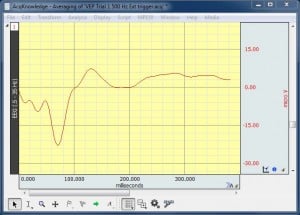ERS: Evoked Response
Powerful, Flexible Hardware and Software Extend Your Research
Advanced software features perform a full range of analysis
Easily acquire and analyze evoked response data

Powerful Tools for Evoked Response Studies
Perform a wide variety of evoked response studies with the powerful on- and off-line averaging features in AcqKnowledge®. Record and measure evoked potentials, Evoked Muscle Action Potentials (EMAP), late potentials, startle, nerve conduction and field potentials as well as visual, somatosensory and auditory evoked responses (P50, N100, P200, N200, P300, N300, N400, P600).
Ensemble averaging and epoch analysis features simplify Advanced Averaging and MP systems allow for Dual Stimulation. Averaging features make it possible to detect signals below the level of ambient noise. Use the stimulator functionality in AcqKnowledge® to output pre-defined waveforms, tones, tone pips, clicks (pulses) or other more complex waveforms. Calculate nerve conduction velocity and recovery time; investigate properties of muscle action potentials and fast nerve impulses. Record and analyze extra-cellular spikes.
Try ERS tools in the free AcqKnowledge Demo
See More...Hardware Packages | ERS: Evoked Response
Hardware Bundles are complete solutions for the specified application. Choose your preferred platform and bundle, then click "Request Pricing" to request an estimate, add/remove items, or complete purchase. If you have questions about specific items, click through to the product web page for details and specifications, or contact your Local Sales contact.
Wired
-
MP36R System plus leads & reusable 8 mm electrodes
Wired | ERS: Evoked Response
MP36R with AcqKnowledge plus lead set, reusable 8 mm snap electrode & gel
-
MP160 System plus ERS amp, electrode cap, and SuperLab System
Wired | ERS: Evoked Response
MP160 with AcqKnowledge plus ERS amp, electrode cap & SuperLab system with Optical Interface
MP36R System plus leads & reusable 8 mm electrodes
- 1 x MP36R Systems
- 1 x Ag-AgCl Reusable Snap Electrodes
- 1 x Lead set, shielded, BSL
- 1 x Tensive Adhesive Gel, 33 ml
- 1 x Abrasive Pads 10/pk
MP160 System plus ERS amp, electrode cap, and SuperLab System
- 1 x MP160 Data Acquisition Systems
- 1 x Module Extension Cables
- 1 x Evoked Response Amplifier
- 1 x Electrode Cap System - TouchProof
- 1 x Abrasive Pads 10/pk
- 1 x Electrode Impedance Checker
- 1 x SuperLab Stimulus Presentation System
Wireless
-
MP160 System plus wireless EEG with reusable electrodes and SuperLab System
Wireless | ERS: Evoked Response
MP160 with AcqKnowledge plus BioNomadix wireless EEG with reusable 8 mm snap electrodes & SuperLab system with Optical Interface
MP160 System plus wireless EEG with reusable electrodes and SuperLab System
- 1 x MP160 Data Acquisition Systems
- 1 x Electrode Leads - BioNomadix Wireless
- 1 x Electrode Leads - BioNomadix Wireless
- 1 x Ag-AgCl Reusable Snap Electrodes
- 1 x BioNomadix 2Ch Wireless EEG Amplifier
- 1 x Tensive Adhesive Gel, 33 ml
- 1 x Abrasive Pads 10/pk
- 1 x Electrode Impedance Checker
- 1 x SuperLab Stimulus Presentation System
MRI
-
MP160 System + EEG amp for MRI and E-Prime Professional Stimulation System
MRI | ERS: Evoked Response
MP160 with AcqKnowledge plus EEG amp for MRI & E-Prime Professional Stimulation System
MP160 System + EEG amp for MRI and E-Prime Professional Stimulation System
- 1 x MP160 Data Acquisition Systems
- 1 x MRI Filtered Cable Sets
- 3 x Leads - RT for MRI
- 1 x Electrode Gels
- 1 x E-Prime Stimulus Presentation System
- 1 x Electroencephalogram EEG Amplifier for MRI
- 1 x Disp. Radiotranslucent Electrode, 100/pk
- 1 x Abrasive Pads 10/pk
- 1 x Electrode Impedance Checker
Animal
-
MP36R System plus visual stim LED, lead adapter, needle electrodes
Animal | ERS: Evoked Response
MP36R with AcqKnowledge plus visual stim LED, electrode lead adapter and 12 mm TP unipolar needle electrodes
-
MP160 System + ERS amp, Stimulator, needle electrodes
Animal | ERS: Evoked Response
MP160 System with evoked response amplifier, stimulator, needle electrodes, module extension cable, and impedance checker.
MP36R System plus visual stim LED, lead adapter, needle electrodes
- 1 x MP36R Systems
- 3 x Needle Electrodes - Animal/Tissue
- 1 x Electrode Lead Adapter, TP
- 1 x Visual Stim LED via Analog out
MP160 System + ERS amp, Stimulator, needle electrodes
- 1 x MP160 Data Acquisition Systems
- 1 x Evoked Response Amplifier
- 1 x Stimulator Module
- 3 x Needle Electrodes - Animal/Tissue
- 1 x Module Extension Cables
- 1 x Electrode Impedance Checker
Details

Powerful Signal Averaging
Average physiological evoked responses in synchronization with stimulus presentation. Remove background noise and extract the signal of interest with the on-line signal-averaging mode. Use the Preferences to set the sweep duration and the number of averaging trials. Specify artifact rejection criteria, and determine the triggering options. Calculate the average and display the result in real time. Count and display the total number of averages, the number of averages left to complete the sequence, and the number rejected from the test. Display and overlap multiple responses for a quick comparison between subjects and trials. Use averaging functionality to examine: Auditory Brainstem Response (ABR), Visual Evoked Response (VER), Auditory Evoked Response (AER) Sequence, Somatosensory Evoked Response, and Electrical Stimulation.
Use averaging functionality to examine: Auditory Brainstem Response (ABR), Visual Evoked Response (VER), Auditory Evoked Response (AER) Sequence, Somatosensory Evoked Response, and Electrical Stimulation. Videos
Support
Application Notes
- 154 - High Level Transducer Connections - HLT100C
- 159 - Hand Switch and Foot Switch - TSD116 Series
- 110 - Amplifier Baseline Offset Adjustment
- 136 - Battery Pack Instructions - BAT100
- 162 - Stimulation Features of MP160/150/100 Systems
- 175 - Stimulus Isolator Guidelines - STMISOC
- 185 - iMac and G3 Compatibility Issues
- 195 - MP System Data Sampling Reference
- 207 - UDP Install: MP150 + No Network Access
- 208 - UDP Install: MP150 + Domain Network Access
- 209 - UDP Install: MP150 + Network Access or Multiple Computers
- 105 - Auditory Brainstem Response (ABR) Testing
- 121 - Waveform Data Reduction
- 122 - Power Spectrum Analysis
- 131 - Averaging Mode in the MP System
- 143 - Importing AcqKnowledge Data Into Excel
- 155 - AcqKnowledge File Formats for the Macintosh
- 156 - AcqKnowledge File Formats for PC With Windows
- 191 - Digital I/O Channels
- 200 - Creating Arbitrary Waveforms for the MP Systems Stimulator
- 201 - SuperLab With AcqKnowledge
- 204 - AcqKnowledge Peak Detector Operation
- 211 - EEG Analysis With AcqKnowledge
- 218 - Hardware API
- 219 - Known Issues - AcqKnowledge
- 102 - Biopotential Amplifier Testing With CBLCAL
- 001 - AcqKnowledge Release and OS Compatibility
- 285 - Identifying Stimulation Threshold
Knowledge Base
- * CLEANING GUIDELINES *
- AcqKnowledge accuracy
- AcqKnowledge backwards compatibility
- Amplifier baseline offset adjustment
- Amplifier conversion - 2 mm to touchproof
- Amplifier filter settings
- Arbitrary waveform stimulation
- Artifact Rejection verification procedure
- Audio recording synchronization
- Band-pass and band-stop filters
- Biopotential amplifier signal validation
- Bipolar EEG
- Buffer overflow
- Calculating file sizes
- CAP100C electrode connections
- Combining Video with AcqKnowledge
- Common mistakes/general troubleshooting
- Connecting the TSD116C Switch Box
- Copy and paste append markers along with data
- Duplicating waveforms
- Editing noisy data
- EEG reference - linked ears, summed ears, etc.
- Electrical stimulation and artifact
- Electrode Properties - gel and adhesive
- Excel files exported from BIOPAC software open in Excel 'Protected View'
- Exporting Data to SPSS
- External Devices and Channel Contention
- Extracting data segments from a file
- Ground vs. reference for EEG recording
- Grounding guidelines
- High pass filters
- How do I sync my stimulus presentation software with my data acquisition software?
- IIR vs. FIR filters
- Interfacing third-party transducers
- LabView interface
- Low pass filters
- Maximum number of channels for EEG
- MP150 UDP protocol fixed IP address
- MRI - Triggering
- Notch filter
- Optimal ground placement
- Outputting a signal through the STM100C
- Physiological measurements - life science signals using BIOPAC
- PPG setup and calibration
- Railing signal (flatline)
- Recording good data
- Text files - import and export
- Upgrading from PCMCIA to USB
- USB Drivers and Controller Communication
- Using other software with BIOPAC hardware
- Visual presentation system triggering the MP150/100
Stay Connected